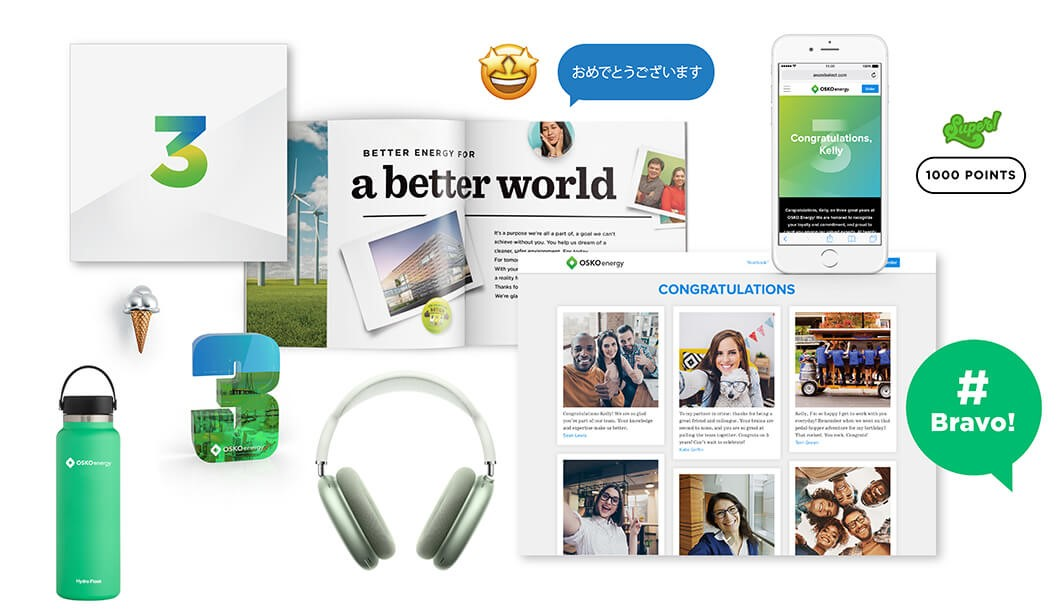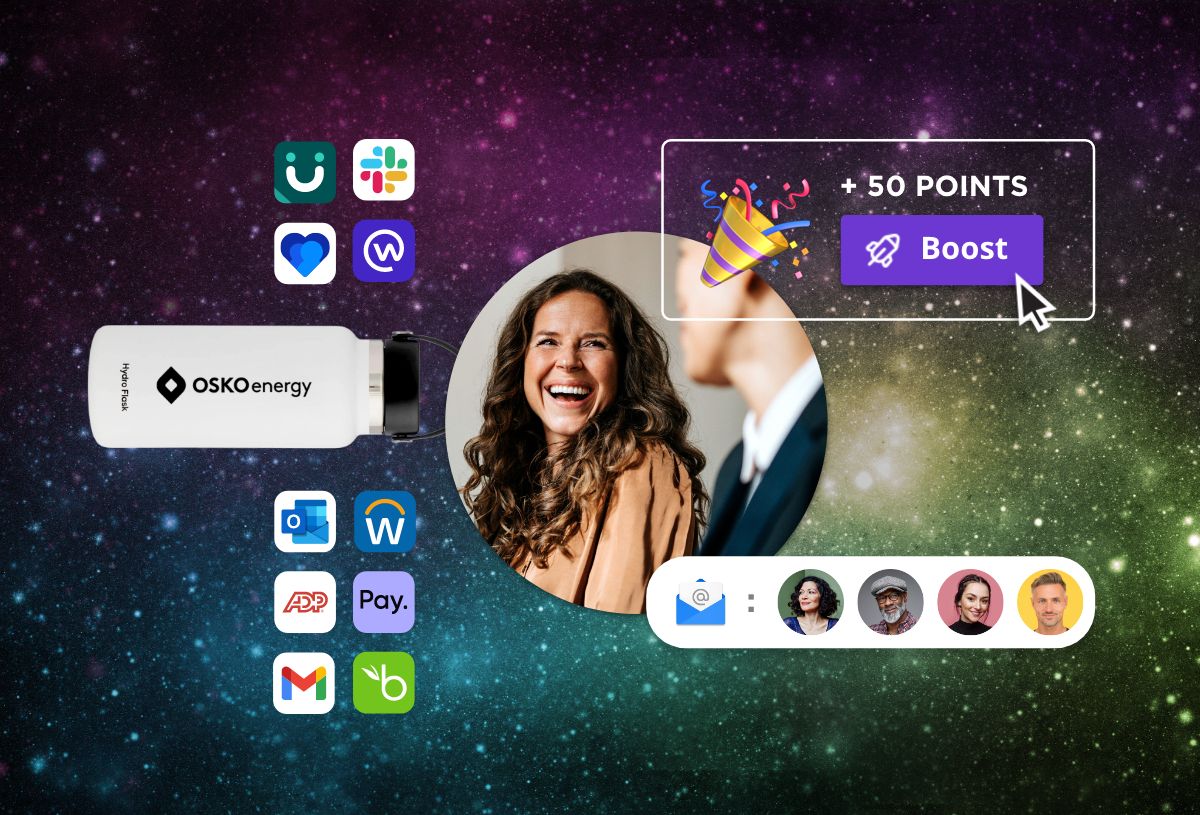The 10 Best Tips for Celebrating Work Anniversaries in 2025

Updated on
March 28, 2025
28
March
2025
Work anniversaries matter. They are important opportunities to reflect, connect with teammates, and recognize the dedication and contributions of your employees over time.
A well-planned celebration—the kind that includes kind words from teammates and leaders, gifts, keepsakes, and fun experiences—can help employees feel seen and valued. Work anniversaries are opportunities to strengthen team bonds and enhance employee engagement. They can even encourage your employees to stay with the company longer.
So how do you celebrate each employee’s tenure at your company?
Here are 10 ideas to help you craft work anniversary celebrations to create lasting memories among your team.
(And if you need some guidance, reach out to O.C. Tanner. We help thousands of companies celebrate careers every day with our Culture Cloud Anniversaries platform.)

1. Personalize the celebration
Get to know the people you’re celebrating. First, and most importantly, how do they like to be celebrated? Do they want a large celebration or a quiet event? This will ensure their work anniversary celebration is exactly what they want it to be.
Next, if you don’t know already, learn more about their history, their experiences, and their life outside of work—family, hobbies, and any stories or anecdotes you can share during the celebration remarks. This is a great time to highlight the version of your teammates that people may not see at work.
Ask them who they’d like to invite to the celebration, such as close teammates, friends from other departments, past leaders, and even family members.
Finally, ask about their favorite food or treat, restaurant, or other activities. If you have the time and budget, incorporating some additional off-site experiences can really bring the team together and elevate the work anniversary celebration.
2. Spotlight specific projects, wins and successes over time
Now that you know some things to share about who your employees are outside of work, it’s time to collect some examples of their successes at work.
Take time to spotlight and discuss things like:
- Major projects and initiatives
- Completed goals
- Job transitions and promotions
- Industry awards or certifications
- Big recognition moments
This is a celebration of all these experiences during their time at your company, so start at the beginning and finish up with some recent wins and accomplishments.
3. Connect to company values
Your employees chose to work at your company for a reason. Use their work anniversary celebration to remind them why they chose to join, and stay, at your organization by connecting their work accomplishments to your company’s values and mission.
You don’t need to make this an entirely separate part of the anniversary celebration – projects and successes (discussed in tip #2) can easily be tied to company values.
Beyond work, share how employees' actions, attitude, and teamwork represent your company values as well. Spotlight a time when they:
- Welcomed a new hire
- Mentored another employee
- Recognized a teammate
- Assisted with a project from a different team
- Supported a team member through a tough time
Teammate connections are an important part of each employee's experience at your company. Make sure to highlight these moments during their work anniversary celebration.
See how BHP, a global mining company, connects their employees to BHP’s values and history during work anniversary celebrations.
4. Create memorable keepsakes
Memorable keepsakes can connect each employee's work to your company values and culture. And personalized notes and cards from coworkers can foster a sense of belonging.
One type of keepsake is O.C. Tanner’s Yearbook through Culture Cloud Anniversaries. It allows leaders to collect messages, photos, and videos in a way employees will treasure. What’s a better way to remember where you’ve been and reflect on where you are going?
Available as both a printed and an online experience, this keepsake gets leaders and peers involved—and it leaves the recipient with a tangible reminder of an organization and team that values their service.

5. Select appropriate gifts for tenure
Work anniversary awards shouldn’t look the same at year one as at year 25. As employees reach higher levels of years of service, the rewards you offer should reflect their seniority. For three years, a piece of tech or homeware might be appropriate. For 25, you might opt for a luxury gift or even a vacation.
How employees feel about themselves, their work, and their organization changes over time. Career anniversary awards should reflect those different stages.

Depending on how long an employee has been with your company, impactful awards could include:
- Jewelry
- Travel vouchers
- Sports and leisure items
- Entertainment experiences
- Electronics
But most of all, the award should match the level of achievement. Let employees know you care about them.
Consider time off, vacations, or sabbaticals
For longer-tenured employees, a great award might be the gift of time. This could be the optimal way to celebrate their work anniversaries.
It might be time off beyond their standard benefits. For example, try giving an employee extra time to spend on a vacation with family at an unforgettable destination. The memories can last a lifetime and will reinforce your company’s support for employees outside of work.
Sabbaticals are another way to structure a time-off award. Unlike a vacation, this set amount of time off may be taken for any kind of personal fulfillment. An employee could use this time to attend a conference, write a book, or fulfill a hobby. The important thing is that the employee is in control of how they use it. The way they choose to use the time will be more creative than anything you could come up with.
6. Present a symbolic award
When we say, “present an award,” we don’t mean those plastic trophies from the store. We mean these:

Custom-designed symbolic awards are a great way to commemorate the unique accomplishments of employees while connecting them to the company as a whole. These awards can be displayed by employees in their office or at home as a memento of their work.
And, according to research from the O.C. Tanner Institute, employees are 3x more likely to remember their work anniversary celebration if it includes a symbolic award.
Because career accomplishments over time are such an important part of work anniversaries, we created a special award to mark the occasion: Careerscapes.

Careerscapes represent employees’ unique careers, growing and adapting with them as they hit milestones and unlock achievements. Employees collect icons and display them within the Careerscapes case.
Learn all about Careerscapes: the collectable career anniversary awards from O.C. Tanner.
7. Plan the celebration in advance
Pulling off a successful work anniversary celebration doesn’t happen by chance. You need time to create a special employee experience.
A few months ahead of the milestone, decide what your awards will look like and who will be involved in creating them. Make sure to allow time for the production of keepsakes or awards.


Set aside the time and place to celebrate the milestone a couple of weeks in advance and invite people to participate far enough ahead that they can plan on being involved.
8. Involve others in the celebration
Over the course of our careers, we work with plenty of people to accomplish goals and complete work. All of these relationships should be celebrated during a work anniversary, so be sure to invite and involve others in the celebration. You can even ask them to share a few words.
For some milestones, it may be appropriate to invite the entire department — or even the whole company. You can also invite people outside the company to participate — family members, vendors, friends, and former employees.

9. Celebrate loudly
If employees are comfortable with it, make sure to celebrate work anniversaries loudly. This helps employees see great work happening across the entire company, and the unique value each individual brings to the organization.
Announce the milestone in a department or companywide email, share it on the Intranet or across the office. You can also post about the celebration on your company’s social media profiles.
If you have an employee recognition program, you can share the milestone on your company’s social wall among every other appreciation moment happening at your company. Employees can like and comment on the post and keep the appreciation going.
10. Keep appreciation top of mind
After celebrating a team member’s work anniversary, it’s important to keep the appreciation flowing. When leaders continue to show appreciation after the celebration, employees feel a greater sense of belonging and connection. There are plenty of reasons to celebrate and recognize employees:
- Onboarding and job transitions
- Reaching goals
- Completing projects
- Improving a process
- Supporting teammates
- Daily wins and acts of kindness
- Holidays like Employee Appreciation Day
- Skill development and certifications
Celebrate work anniversaries and career milestones
Work anniversaries mark significant milestones in an employee's career. Celebrating them demonstrates that your company and their teammates value their efforts and commitment.
Acknowledging work anniversaries helps:
- Boost employee morale and motivation
- Create a positive work environment where employees feel seen, respected, and encouraged
- Build team camaraderie, connection, and a positive organizational culture
- Establish a culture that values and appreciates employees' contributions
- Improve employee experiences and performance
The 10 tips covered above lay the foundation for peak career milestone celebrations. If you want to take these experiences to the next level, check out our full guide to celebrating career anniversaries in your organization.
O.C. Tanner helps thousands of companies around the world celebrate careers on our Culture Cloud Anniversaries platform with automated reminders, custom awards, Yearbooks, and elevated experiences. Reach out today to learn more.



